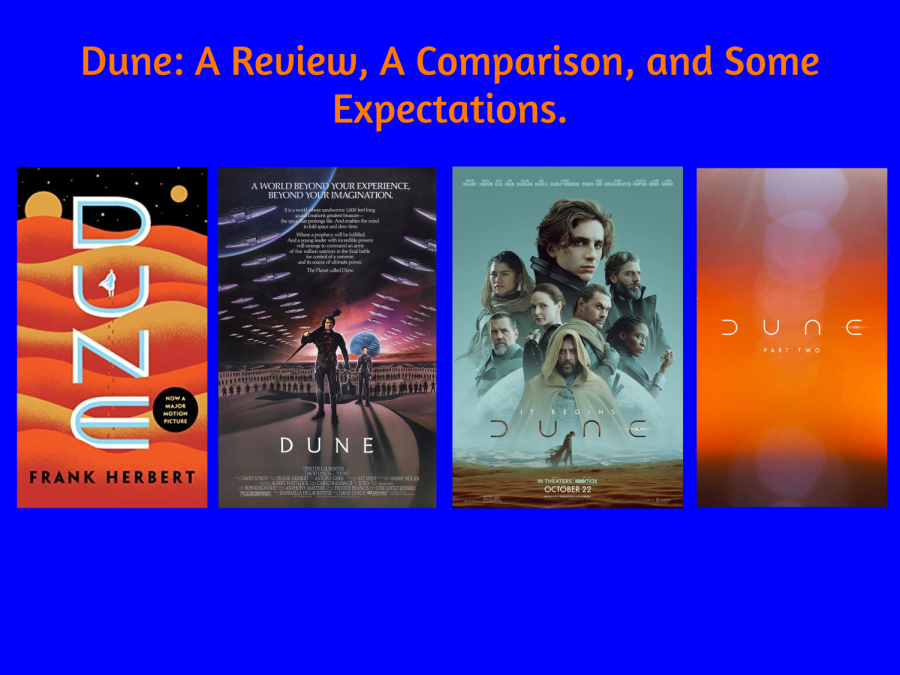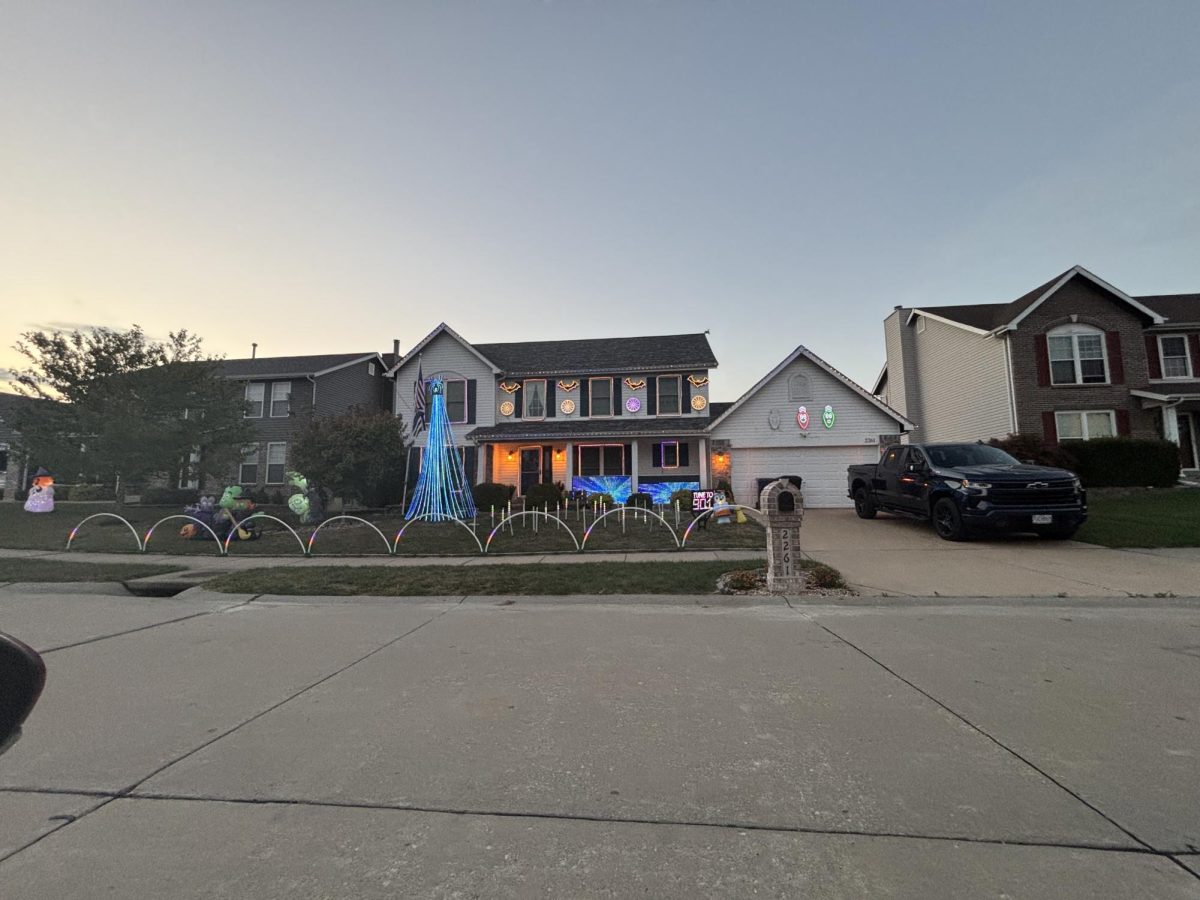Dune: Reviews, Comparisons, and Some Expectations
October 25, 2022
“Dune” has recently become a near-iconic piece of media, getting as popular as other science fiction franchises likem “Star Wars,” or “Star Trek.” Things are not looking like they are going to go downhill from here, as the sequel of the 2021 movie will be out soon.
According to Variety, “It was revealed on Tuesday that the highly anticipated sequel to Denis Villeneuve’s sci-fi epic will hit theaters on Nov. 3, 2023, instead of Nov. 17, 2023.”
With the second film nearly a year away from release, lots and lots of excitement has been prominent for the movie.
However, not a lot of people have absorbed the original content of this ambitious title. There is, of course, the daunting. almost 800 page novel, and the original film adaptation that came out in 1984, directed by David Lynch.
Each installment in the “Dune” category provides different experiences that makes each one interesting, whether it be the ambiguous writing in the book the , and the spacious and grand feeling of the new film.
There will be spoilers for the first “Dune” book, and the movies. The other books in the series of “Dune” will not be covered as to stay in sync with the movies, which only cover the first book installment. Also please know this is based on opinion.
Of course, the beginnings of this sci-fi franchise started all the way back in 1966, when the original book was published. Frank Herbert was the author of it, he was born in 1922 and had unfortunately passed away in 1986, just two years after the original “Dune” movie was made.
The book is a very interesting piece in the overall “Dune” catalogue, and it’s arguably the most controversial. Some love it, and some hate it. These two opinions could pretty much be narrowed down to the writing. The writing in this book is very long-winded and dense, and with the book coming in at 794 pages, some might not enjoy how almost biblical the writing feels.
It’s arguably the most troubling aspect of the book, as the writing can be very difficult for someone to get used to. However, that’s not to say it is flat out illegible. Of course, the writing takes some getting used to, but being able to power through that aspect can lead to reading some beautiful passages like this:
“I must not fear. Fear is the mind-killer. Fear is the little death that brings total obliteration. I will face my fear. I will permit it to pass over me and through me. And when it has gone past I will turn the inner eye to see its path. Where the fear has gone there will be nothing. Only I will remain.”
Unfortunately, the writing along with the pacing brings some problems. The pacing can often feel a bit rough, most of the time it feels like that when certain scenes feel as if they go on for way too long, making the story feel a lot longer than it needs to be.
There are some scenes that are vital to the plot, yet they are stretched out far beyond needed, to where any reader could just anticipate and wait impatiently for the scene to move on or build up into something larger. It is not like Herbert needed to cut down on the sequences, but rather cut down on the pacing in each sequence, so that the overall plot could have a better flow.
This fatal flaw brings the book down from a certain status in quality, but that doesn’t mean it has hit rock bottom. In fact, “Dune’s” highest points are what make the book such a revered classic, and they are definitely phenomenal.
Of course, how could you mention “Dune’s” high points without mentioning its world-building and lore? It is one of the best out there, up there with titles like “Lord of the Rings” in terms of it. Everything from the miniscule details of each character to the description of common traits and culture of the people on the planet Arrakis, to the other things in Arrakis. Things like the sandworms, the spice, or the Fremen.
Everything in terms of creating a large world with a vast amount of characters, species, technology and beliefs is done with care and precision done by Herbert.
The characters feel like they are in the world of “Dune,” in the ways that they interact with each other. The way they speak very formally yet with ambitions bigger than the planets that they inhabit feels real to the world of “Dune.”
“Dune” delves very well into the darker parts of humanity. Our habits of greed, our craving for power, riches, and fame. But it also has characters who are aware of these flaws and just live with them, or characters who are confused about these flaws.
The main character, Paul, is a perfect example of someone who is confused with the world he lives in. He grows up with his mother and father, living in the House of Atreides. He grows up knowing what he thinks his destiny is, only for that to be taken away by someone else, who has already created a path for Paul.
Of course the book also goes into detail of what Paul goes through as he achieves his destiny that was made for him, through all of his accomplishments and mistakes, showing that even though he may be on the right path that was made for him, it can bring harm to others, and the results will not always be positive.
Other than Paul, characters like Jessica, the Baron, Duke Leto, Gurney Halleck, and Stilgar all have interesting purposes that revolve around Paul’s journey, as well as having their own different character arcs.
Ultimately, the book excels with its world building, themes of humanity, and its character work (partially). However, it falls pretty flat when it comes to the pacing, and the writing is a bit of a troubling subject as some people love it and some people hate it.
So how does the book compare to the movies?
Well, for one, the first movie’s (the film made all the way back in 1984) pacing is almost opposite to the book. Especially in the second half, going at break-neck speed to complete the entire story of “Dune.” It’s the film’s biggest flaw, especially in the abrupt ending. It does bring up something a bit interesting though.
David Lynch claimed that he had no total creative control of the film during its creation. It’s something to be considerate about with the film’s result, especially the flaws of that result.
The special effects can be pretty flimsy and rough at times, resulting in the film being more laughable. To be fair, the film was in the 80’s, so the effects won’t exactly be top notch.
The acting is mediocre at best, but there are only a few moments of cringe or odd moments in terms of the actors.
Overall, the film feels quite odd and clunky. The fast pacing leaves some characters and moments to be pushed to the side or just left out completely. The effects are laughable at a lot of points, and the acting is sub-par. It is said by many “Dune” fans that Lynch wasn’t really able to capture the gigantic world of “Dune” in the best way possible, which is a statement that is very agreeable.
It is not what “Dune” could be, but it was an honorable attempt, for sure. However, there is another film out in the world, one that came out just last year (at the time of creating this article).
Denis Villeneuve’s “Dune” just might be the best adaptation, other than the original book. It takes what flaws the original 1984 film has and fixes them up in a way that is satisfying and awe-inspiring.
For one, the pacing, which is a big problem in both the book and the old movie, is fixed. In this movie, it feels like each moment feels presented in a way that is just right. None of the scenes really seem to drag, other than a few in the second half of the movie.
Admittedly, some characters do leave a little bit to be desired, like Kynes or Dr. Yueh. Kynes felt a bit bland, only having a personality trait of telling Paul and the Atreides House everything they need to know when necessary for the plot. Of course, Kynes in the book wasn’t that different, but he had a little bit of depth. He had a secret prideful attitude that he tried his best to hide away, and some of the passages in the book analyzed his conflicting relationship with his father.
Dr. Yueh in the book did not have much fleshing out, but in the movie that “fleshing out” is completely gone. He has one or two scenes of dialogue before his inevitable betrayal of Duke Leto, and the attack on the Atreides.
The other characters are not a strong point for the movie, but they are not terrible. They are all at least similar to the book, but not as fleshed at as they could be.
Flaws like these bring the film down a little bit, but what helps it keep standing is the artistic aspect of it. Every single scene feels large, whether it takes place in the vast deserts of Arrakis or even the insides of buildings. Everything feels larger than life, which is perfect to portray how big the world of “Dune” is.
It also just happens to be quite a beautiful movie. For instance, the attack on Atreides.
From the moment this sequence began, the film shows a spectacle of devastation and destruction. Every single perspective of this scene is drawn out perfectly to show how dark this scene is.
Every single scene feels like this but in a different way. The art and atmosphere was done almost perfectly to suit the world of “Dune.”
All of these aspects come down to one major aspect. The new “Dune” movies are going to be split up into a trilogy. This allows a lot more scenes to be fleshed out and put back in, while the older film, made by David Lynch, covered the entire saga in two hours, causing a lot of important scenes or details to be left out, making a less cohesive film.
This first film of Denis Villeneuve’s new “Dune” trilogy is also about two hours, but it only covers the first part of the book out of three. This provides Villeneuve a lot of breathing room to include anything he can to make a good book-to-movie epic.
Unfortunately, the characters are not a high point when it comes to the first film in Villeneuve’s trilogy, but everything else brings the world of “Dune” to life, having jaw-dropping visuals and pacing that makes the film flow a lot better, not to mention a few scene changes that bring a lot more suspense and anticipation to the story.
So where do we go from here? There is still another movie coming out next year, and it will not be the end of the saga. The only thing we really can do is predict and provide expectations.
For one, the next “Dune” movie will be covering part two of the book, which is a little bit tamer in terms of action and destruction. However, we will hopefully be getting a lot more interesting lore and background information, and pivotal moments like Jessica becoming a Reverend Mother, or Paul gaining his leadership role to the Fremen and their culture.
Admittedly, when the third movie in the trilogy comes out, it could be a lot more exciting than this sequel, but that is not to say that the sequel will be terrible. It could still pack as big of an artistic punch as the first movie did, but in a more subtle way.
“Dune” is quite an interesting franchise and story. It has inspired a lot of other franchises that we know and love like “Star Wars,” and it has monumental moments and quotes that stand the test of time. While there are flaws in every installment and adaptation of “Dune,” they all each provide an experience like no other. Hopefully the newest batch of films will provide an experience that is just as interesting.






























